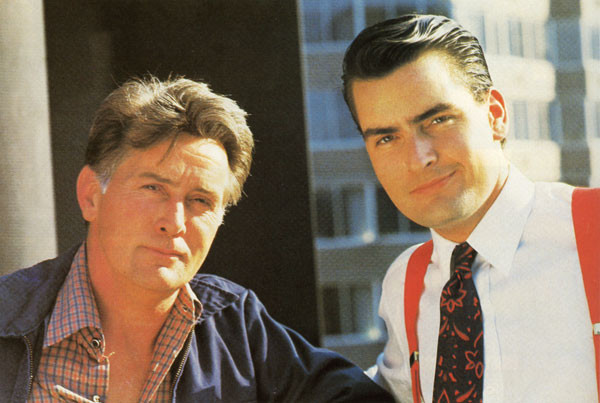Oliver Stone’s 1987 cinematic juggernaut, Wall Street, remains a cultural touchstone, and with good reason. Even decades later, the film’s portrayal of ambition, greed, and the intoxicating allure of high finance – that unmistakable Wall Street Sheen – continues to captivate and resonate. Before diving into the much-discussed sequel, Wall Street: Money Never Sleeps, it’s crucial to revisit the original, a film that arguably defines the excesses and aspirations of the 1980s. I’ve consistently ranked Wall Street as Stone’s best work, and a closer look reveals why it deserves such high praise.
The narrative centers around Bud Fox, played with eager-eyed ambition by Charlie Sheen, a young stockbroker desperate to break into the upper echelons of Wall Street. He yearns for a piece of the action, and his idol is none other than Gordon Gekko, the ruthless corporate raider who embodies the decade’s materialistic spirit. Gekko, portrayed in an Oscar-winning performance by Michael Douglas, isn’t just successful; he exudes a dangerous charisma, a magnetic pull that promises power and wealth beyond imagination. Fox relentlessly pursues Gekko, finally securing a coveted five-minute meeting that will change his life forever.
Stepping into Gekko’s office is depicted as entering a high-stakes command center. The atmosphere is thick with tension – papers scattered everywhere, the haze of cigarette smoke, hushed whispers of clandestine deals being struck in hushed tones. When Gekko finally appears, he’s a whirlwind of energy, barking orders and financial jargon into the phone, a language seemingly designed to intimidate and exclude outsiders. He is presented as a force of nature, unapologetically aggressive and utterly unforgiving in his pursuit of profit.
Fox, understandably intimidated, nervously pitches his stock ideas. Gekko, initially dismissive, barely acknowledges him, more interested in monitoring his blood pressure and dismissing Fox’s suggestions as “dogs with fleas.” Just as Fox is about to lose hope, he mentions “Blue Star Airlines.” This is the company where Fox’s father has dedicated his life, and crucially, they are on the cusp of receiving a favorable government ruling regarding a past airplane accident.
This tidbit piques Gekko’s interest, not necessarily for the inherent value of Blue Star, but because he senses that Fox possesses something more valuable: inside information. Once Gekko confirms Fox’s access to privileged knowledge, he takes the young broker under his wing, initiating him into the seductive and morally ambiguous world of high finance, a world dripping with that wall street sheen.

Martin Sheen and Charlie Sheen in Wall Street, portraying the contrasting values of father and son amidst the glittering but morally compromised world of high finance.
A compelling undercurrent of the film is the potent father-son dynamic. Bud Fox is torn between two powerful paternal figures: his principled, blue-collar father, Carl Fox (played by Martin Sheen, Charlie’s real-life father), and the alluring, yet morally bankrupt, Gordon Gekko. This internal conflict is powerfully visualized when Bud visits his father in the hospital after a heart attack. In this deeply moving scene, Bud’s attempt to reconcile his choices and make amends is genuinely heart-wrenching, highlighting the emotional cost of chasing the deceptive wall street sheen.
Wall Street is masterfully paced; the narrative flows seamlessly, never losing momentum. While the intricacies of stock trading, bonds, and financial maneuvers are not simplified, the film doesn’t condescend to its audience. It trusts viewers to engage with the complexities, and the compelling performances and gripping storyline ensure that even the most intricate financial terminology becomes digestible within the dramatic context. The performances truly elevate the film. Charlie Sheen and Michael Douglas deliver career-defining performances, with Douglas rightfully earning the Academy Award for Best Actor. The supporting cast, including Martin Sheen, Terrence Stamp, John C. McGinley, and Hal Holbrook, further enriches the film’s texture and depth.
Oliver Stone’s directorial vision makes the film feel strikingly authentic, capturing the zeitgeist of the era. The iconic long shot of Gekko and Fox meeting in Central Park towards the film’s climax is a cinematic masterstroke. It encapsulates the materialism, the relentless drive, and the underlying moral ambiguities of the 1980s with breathtaking precision. The film’s enduring relevance is undeniable. One could argue that the unchecked ambition and ethical compromises embodied by Gordon Gekko and the seductive wall street sheen he represents have contributed to the very economic landscapes we navigate today. Wall Street is not just a film; it’s a prescient and powerful commentary, solidifying its place as Oliver Stone’s masterpiece.
Review: 10/10

